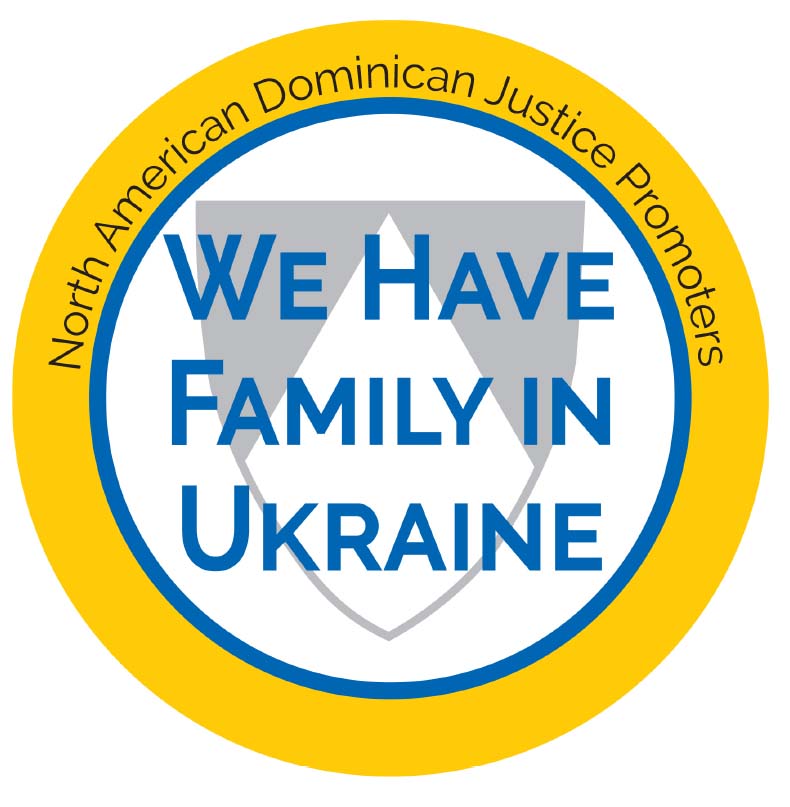“O God, one and great, protect our Ukraine” – Notes from Ukraine, Saturday, March 26, 2022
Boże wełykyj jedynyj, nam Ukrajinu chrany
(“O God, one and great, protect our Ukraine”)
Considered the spiritual anthem of Ukraine, it was composed in 1885 by Mykola Lysenko after modern Ukraine regained its independence.

Notes from Ukraine, Saturday, March 26 – Wieści z Ukrainy. Sobota, 26 marca
Dear sisters, dear brothers,
Like many of the faithful around the world, we spent yesterday focused on Mary, Mother of God. In the evening, together with a few fathers and most of the people who now live in our priory, we went to the Kyiv Cathedral of Saint Alexander where, in spiritual unity with Pope Francis, we prayed the Act of Consecration of Ukraine and Russia to the Most Sacred Heart of Mary. The Mass was presided by Bishop Vitalij, the ordinary of the Kyiv-Zhytomyr diocese. The homily was preached by the apostolic nuncio. Archbishop Visvaldas is Lithuanian, and he was nominated quite recently as ambassador of the Holy See to Ukraine and ordained a bishop. He is one of very few diplomats who have not left the capital of Ukraine. Let me add that he is one or two centimeters taller than me, and whoever knows me is aware that I am not short. When he entered the sacristy before the Mass, we exchanged warm greetings, and we joked about his new beard. “Well,” the nuncio responded, “it’s war.” He is not the first bearded Vatican diplomat in Ukraine. His predecessor, an Italian man, also had a beard, making some of our Ukrainian bishops cringe since they don’t like priests with beards. The priests from Kamyanets-Podilskyi or Khmelnytskyi know very well that when they are about to meet their bishop, the first thing they have to do is shave. But the title of nuncio has its perks.
Normally, the Kyiv cathedral is full on solemnities. Yesterday, there were no more than fifty of us. It’s still not bad for wartime. Many of the faithful have left the city, and those who stayed often have no way of getting to the city center. The public transportation system isn’t working, and everyone must go home before 8pm, when the curfew begins. There are no traffic jams on the streets, but the necessity of stopping at multiple checkpoints, showing documents, opening the trunk, and explaining who you are and what you’re doing, takes time. Besides, many people are simply afraid of staying away from their houses for too long because multiple times a day, explosions and gunshots reawaken our fears and remind us of war.
Among the people praying, one could see many men and women in uniforms. Some heavily built men stood discreetly in the back of the church with assault rifles. Nobody was surprised by that, and nobody objected. After the Mass, Bishop Vitalij was approached by two men dressed in military uniforms who asked him for a blessing. The bishop prayed for an extended time over each one of them. He seemed to be clearly moved, just like I was.
During the offertory, the woman at the organ played and sang in Ukranian a very well-known chant, “Canticle of Hope,” by Father David Kusz, OP. The words of the refrain, “In his great mercy God gave us birth to a living hope, a great living hope,” profoundly pierced our hearts, clearly revealing God’s dimension of the events around us. David visited us in Kyiv a couple months ago, and he gave a workshop on liturgical chant. The next workshop was supposed to happen at the end of February, but the war ruined that plan.
There was another chant that moved me deeply. When we were reciting the act of consecration following our bishops, while kneeling before the figure of Our Lady of Fatima located in the side chapel, the whole cathedral was filled with: “Boże wełykyj jedynyj, nam Ukrajinu chrany” (“O God, one and great, protect our Ukraine”). This song is considered the spiritual anthem of Ukraine. On the way back to the priory, Anton explained to us that the song was composed in 1885 by Mykola Lysenko; after modern Ukraine regained its independence, it was a candidate for the national anthem. Although it wasn’t chosen in the end, the song is well-known and frequently sung by Christians of both eastern and western traditions. Years ago when I was working with Father Thomas, who currently lives in Lviv, we both served in Chortkiv in Podole; we were enchanted by a beautiful performance of this song by a few elderly people from Shypivtsi who would sing at our daily Masses in a small chapel at the old Polish cemetery. If you would like to hear a modern version of this spiritual anthem inside Kyiv’s Sophia Cathedral, click here.
It would be good to use the opportunity of this Act of Consecration to add that, for Orthodox Christians, the worship of the Heart of Jesus and the Heart of Mary is rather confusing and deeply surprises some of them. Even those who became Roman Catholics but grew up in the Orthodox tradition can’t always grasp its spiritual meaning.
Yesterday, Brother Igor passed the exam, Ex Universa, which was the last stage of his theological studies at the Dominican College in Krakow. Igor took it online from Fastiv. It must be the first exam in the modern history of our college to be taken by a brother in a country at war. The last time I saw him, we were joking that when the faculty committee hears the sirens and explosions outside his window, it would soften their demeanor. But the sirens did not blare, and even if they did, there was no need to treat Igor in a forgiving manner because he’s a great student; despite the confusion of war, he was well-prepared. After all, he’s a Dominican. I hope that we’ll be able to plan his priestly ordination for the beginning of May.
As relatively quiet as the last few days were, today the sirens have been blaring since the early morning. Even Father Misha called me before noon, worried because he heard that something bad is happening in Kyiv. I hope that the coming hours will not surprise us with some terror. Yesterday the stores and streets of the city were filled with people. The stores are much better supplied, and one can see much fewer empty shelves. I am worried, however, that even if the merchandise doesn’t run out, people won’t be able to get the money to buy anything. The majority of us have lost our sources of income. The humanitarian help arriving in Ukraine is truly life-saving. Although it doesn’t solve all the problems, it offers enormous support for many, especially the weakest ones. Dear friends, we will remain grateful to you forever!
Mr. Jacob, a Polish journalist who stays with us sometimes, told me this morning at breakfast that he just came back from Kharkiv and that some regions of that large city look like Warsaw did after the uprising; they’re completely ruined. It’s hard to find an open store, even in the neighborhoods that didn’t suffer from Russian bombs. If not for the humanitarian help, many people wouldn’t have anything to eat by now. Jacob also showed us a very symbolic picture: some bombs had fallen on the cemetery outside of Kharkiv where the victims of the Katyn Forest Massacre were buried in 1940. One of the bombs didn’t explode but got stuck in the ground next to the cross at the tomb of the Polish officers murdered by NKVD. Very thought-provoking.
Today our accountant stopped by. At the beginning of the war, she took her children and moved to a village in the neighboring region. I was very happy to first see her little red car parked outside my window, and then see Svieta herself. When she was leaving, she took two boxes of infant formula. The boxes arrived some time ago with the humanitarian aid. However, we haven’t had infants in Kyiv recently, and we had no idea to whom we could offer these treasures. Svieta took them with gratitude, since she is an active volunteer and helps a lot of people in her neighborhood. “We have many mothers with children, sometimes newborns,” she said. I was happy that the gifts offered from the bottom of someone’s heart will soon reach people in need. She also took a few items that the Polish ambassador recently left, among them an electric kettle. These days, many old village huts that had been empty for years are finding new inhabitants. Polish tea kettles are becoming very useful on Ukrainian Taras Shevchenko soil.
With warm greetings and request for prayer,
Jarosław Krawiec OP, Kyiv, March 26, 2022, 5:30 pm
Return to NEWS
Shem Center for Interfaith Spirituality
708 North Harvey Avenue
Oak Park, IL 60302
(708) 848-1095
shemcenter1993@gmail.com
Photo Credits: Emory Mead, Stephen B. Starr, Joseph Kilikevice
The Shem Center for Interfaith Spirituality website is awarded a 2022 American Digital Design Award for excellence in design and user experience.
